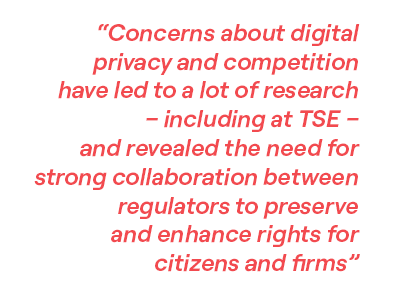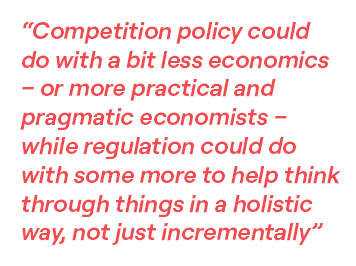 TSE alumna Pascale Déchamps is Deputy General Rapporteur at the French Competition Authority. She handles antitrust infringement cases in the digital and telecom sectors, with a focus on online advertising. Her team has worked on major actions such as rejecting interim measures on Apple for its App Tracking Transparency system, fining Google €220 million for favoring its own services, and the first commitments (about the ad sector) made by Meta to a competition authority. Pascale has been teaching at TSE since 2019.
TSE alumna Pascale Déchamps is Deputy General Rapporteur at the French Competition Authority. She handles antitrust infringement cases in the digital and telecom sectors, with a focus on online advertising. Her team has worked on major actions such as rejecting interim measures on Apple for its App Tracking Transparency system, fining Google €220 million for favoring its own services, and the first commitments (about the ad sector) made by Meta to a competition authority. Pascale has been teaching at TSE since 2019.
How would you describe the current atmosphere of the digital economy?
The digital economy remains very fragmented in most markets. There are still vast opportunities opened up by digitalization and disintermediation, which ‘cuts out the middlemen’ between producers and consumers, and plenty of healthy competition. However, there are a number of markets where concentration is high and competition no longer appears to drive innovation, change and better quality for consumers. The digital economy today operates in a world that is grappling with significant geopolitical and economic challenges and uncertainties. Enabler of faster growth and globalization, the digital economy is also now faced with higher barriers to expansion and reduced competitive pressure arising from economies of scale, economies of scope and network effects.
Historically, digital markets were characterized by competition through fast innovation. Successful businesses disappeared, replaced by entirely new businesses building on different technologies or ways to engage with consumers. However, this description no longer applies to many everyday online services. Online search, desktop operating system, social media, browsers, maps, online advertising, smartphones… all these markets have experienced little, if any, competition over the past decade. Although companies offering these services invest heavily in innovation, these services have remained fundamentally the same for quite some time. Competitors have been unable to enter or develop to any significant scale.
This is partly due to the nature of these markets, with network effects, economies of scale and scope, and learning factors at play. But it may also be the result of concentration achieved through illegal means. That’s what competition authorities need to prevent, with ex-post investigations and, as passed recently in the EU, with ex-ante regulation.
Can you illustrate this with a recent antitrust investigation?
Meta very recently made commitments to the French competition authority to change and improve the way it interacts with third-party advertising technology providers on its social networks (Facebook and Instagram in particular).
From 2016, Meta started integrating vertically into advertising technology, making it compulsory for advertisers to use its own API software to show ads on Facebook and Instagram. Some third-party technology providers, though considered historically as “partners” by Meta, were either obliged to adopt Meta’s technologies or taken out of the partnership program.
The June 2022 decision obliges Meta to work with third-party providers using objective criteria that allow for competitive differentiation while protecting Meta’s reputation. It includes the creation of an API that should make it possible for advertisers to have more choice when advertising on Meta’s services. It also re-opens access to partnership for companies that were unduly excluded.
This case is an example of practices that are unseen by users of the services (including most advertisers), yet contribute to the rise of barriers making it harder for third parties to compete with the incumbent across the range of competitive touchpoints in which it operates. The intervention helps address a specific concern that arose as a result and sends a signal to large platforms to encourage competition.
How can competition authorities adapt to rapidly changing digital markets?
The pace of change in areas including data collection, sharing and processing in IoT is particularly challenging. Online advertising, AI and other digital markets can also be highly technical and complex, with new legal difficulties such as proving collusion in a world of algorithms or the interconnections with privacy law.
Authorities can adapt to these challenges by developing their own technical capabilities and monitoring developments to better understand market functioning and anticipate potential competition issues. At the French competition authority, in addition to the existing Digital and Telecom unit, a new Digital Economy unit was created in October 2020. We now have people with practical experience in some digital markets in my unit, and a transversal unit that covers the principles and research for digital matters that cut across sectors. Ours is one of the few competition authorities to have a well-functioning interim measure procedure that allows speedy intervention in the most pressing cases. It also makes use of commitment and settlement procedures to quickly restore competition.
New tools can help authorities to intervene faster and provide better guidance. Efforts in this area over the past couple of years have led to the Digital Markets Act (DMA). We must also maintain dialogue with other relevant authorities. Concerns about digital privacy and competition have led to a lot of research – including at TSE – and revealed the need for strong collaboration between regulators to preserve and enhance rights for citizens and firms.
What is the role of economists in competition policy and regulation?
Economists have been essential in shaping competition policy in Europe over the past 50 years, providing for diverse market situations while strengthening enforcement of the law. For example, “effects analysis”, which helps us to understand how a particular practice by a dominant firm in two different markets may have very different competitive impacts, is among the most valuable contributions of economics to competition law.
However, economists have also contributed to this notion that somehow “it [always] depends”, raising the standard of proof for competition authorities to unprecedented levels. By convincing judges, in particular, that all circumstances and facts need to be taken into account during investigations, economists have generated more work for competition authorities, lawyers and consultants. This has led to lengthier processes without, arguably, improving outcomes.
All commentators of European law lament the time it takes for any case to be decided. In digital markets, this concern has even more impact as swift intervention may be key to restoring competition before it is too late. The answer to this issue in the digital sector has been ex-ante regulation: notably, the DMA, which to some extent does away with economics in favor of expediency. From an overdose of economics, the pendulum has swung in the other direction in an effort to set the standard of proof at more achievable and manageable levels for competition authorities.
 Regulation generally tends to make less use of economics in its everyday workings in favor of rules that are hopefully clear and easy to apply by market participants. Economists can get involved at the stage of market design but this is rare in most European countries, except the UK. The flexibility and ability to take into account specific situations that good use of economics requires is perceived as incompatible with effective regulation. Maybe more economics could help address some of the incredible challenges – from energy and water supply to rail transportation – affecting regulated sectors in many European countries.
Regulation generally tends to make less use of economics in its everyday workings in favor of rules that are hopefully clear and easy to apply by market participants. Economists can get involved at the stage of market design but this is rare in most European countries, except the UK. The flexibility and ability to take into account specific situations that good use of economics requires is perceived as incompatible with effective regulation. Maybe more economics could help address some of the incredible challenges – from energy and water supply to rail transportation – affecting regulated sectors in many European countries.
My short answer is that competition policy could do with a bit less economics – or more practical and pragmatic economists – while regulation could do with some more to help think through things in a holistic way, not just incrementally.
You regularly engage with the TSE alumni community, which aims to connect, guide and help students to gain visibility and develop their futures. Do you have any career advice?
I have fond memories of my time at TSE (before it was even called TSE!). Beyond the amazing environment of the university and the city, I found it a great time to learn and to reflect on economic findings. I learned new ways of approaching economic issues, which broadened my perspective and understanding of how our economies work. I embraced the economic way of thinking, its framework built on rational and scientific analysis of social and economic phenomena. These phenomena are becoming less rational and predictable, but it takes away nothing in terms of the relevance of the framework itself.
On the basis of this experience, I recommend students to take all opportunities (including further discussions with faculty members, events, guest speakers, workshops, or opportunities at associated universities) to put learnings in context. Try to think beyond the models and see how what you learn has traction and helps you understand the real world. Most importantly, have fun, follow your dreams, and create strong links with other students. They are your lifetime friends as well as the beginning of your professional network.
All views expressed above are Pascale’s own and do not represent in any way the French competition authority’s perspective on these matters.
Article published in TSE Reflect, September 2022
Photo © Pascale Déchamps, © Unsplash
